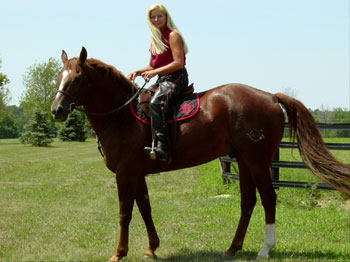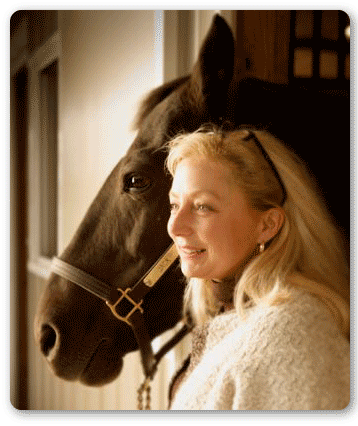Summer Safety

However, enjoying those hot summer days brings up special safety issues for both our horses and us. Let's look at some particular ways we can both be more comfortable and stay healthy through the sweltering summer months.
The most obvious, and one of the most important considerations, is shade.
At home, make sure your horse has access to a shade tree or some type of cover when in pasture. Sheds & lean-to's create shaded areas and provide shelter from potentially dangerous summer thunderstorms.
On long rides, take regular breaks and try to plan your ride through areas that will provide good shade and sources of water to give you and your horse relief from the sun. It is easy to forget that since our horse is carrying our weight along with his own, he is exerting more energy than we are. If we are feeling the heat, our horse is even hotter than we are!
If you are at a horse show, it may be difficult to find a shaded area in between classes. At the least, take your horse on a leisurely walk through the grounds to find some relief from the sun and heat. Many horses end up tied to a trailer without water or the ability to get out of the sun. It is so easy for owners and riders to get distracted watching the show, or lost in the planning of their next class. Be sure to check on your horse frequently so he can give the performance you both want. While participating in shows, riders generally wear the required show attire that most often includes jackets and vests. Summer-weight show clothing is well worth the investment and makes a big difference in keeping you cool. Plan ahead to bring a cooler with water and sports drinks (the type that replenish electrolytes) so that you can stay hydrated.
Of course, hydration is critical for your horse as well.
Horses drink much more water in the hotter months. Be sure to check automatic waterers for proper filling, or water troughs for fresh water content. Horses that don't have access to automatic waterers may need buckets and troughs filled multiple times each day. Water troughs are great for areas with several grazing horses, but algae can form fast in hot weather, tainting the water and attracting bugs. Be sure to wash and clean troughs frequently and thoroughly. A long-handled brush can make the job easier and less time consuming.
Electrolytes are important for horses and humans alike.
Electrolyte additives are available at most tack stores to supplement your horse's water. During hot shows or long trail rides where your horse is exerting more energy, or if your horse seems to be having a particularly hard time dealing with the heat, consider using electrolytes to improve his hydration. In a pinch, you can even add some of your own Gatorade or similar sport drink to your horse's water.
Along with heat, summer brings in hosts of pesky, swarming flies and other critters.
They can turn a long-awaited, planned ride into an uncomfortable, miserable ordeal. They can also turn a productive training session with your horse into a disaster. There are many types of sprays, wipes, and interior barn sprays that will help repel flies, mosquitoes, ticks and other insects.
While in the pasture, if your horse has to stay in constant motion hopping, swatting, and shaking frequently because of pests, give him or her relief with a good fly spray.
If your horse dislikes being sprayed, use a cloth saturated with the spray and wipe him down. Place the used cloth in a plastic bag and keep it for the next use. Pay special attention to the ears, face around the eyes (being careful to avoid getting any product in the eyes), as well as legs, rump, and the rest of the horse. During a ride, take along saturated cloths as "wipes" if additional fly control is needed. Fly masks can also be used to protect your horse's face while he is in the pasture. Ear and forelock covers provide additional protection during rides. Of course, don't forget to apply a ''human'' insect repellent to yourself, as well.
Another potential ''summer problem'' to watch for is dry hoofs that can crack and chip.
Using a good hoof oil will help correct the drying that occurs from hot, dry weather and ''fly stomping.'' Used daily, improvement will be quick and readily visible. There are also supplements available that can be added to your horse's grain. If heavy cracking occurs, check with your farrier to see what is needed to prevent further injury. Shoes and/or pads can help dramatically.
;
If your horse has grazing access to summer grass, his nutritional needs will vary in the summer.
Ask your local grain elevator for a summer mix, instead of a winter mix. For the same reasons we tend to eat lighter foods in the summer, your horse can actually stay cooler eating a summer grain mix because his body doesn't have to work as hard at digesting the lighter fare. Because your horse will lose more fluid during the summer (i.e., sweat), sodium levels will also be a concern. If your grain or supplement does not contain salt you may want to get a salt block or mineral/salt block for your horse. Again, just like we do, horses need salt in their diet, and it helps to keep them hydrated.
During extended periods of extremely high temperatures, it may be best to keep your horse in his stall.
Position a fan to circulate air and help keep flies down. A simple box fan on the outside of the stall will do wonders to keep your horse cool. If you have a location where you can install the fan above the stall angled toward your horse, you will be able to create even better airflow. So that your horse doesn't get claustrophobic and anxious about being confined to his or her stall, considering turning him out at night instead.
If your area is experiencing a drought, or if your horse is in a dry lot area, be sure to have grass hay available.
Horses are grazing animals and need to "munch" throughout the day. Otherwise your horse will resort to "digging" in the dirt to find roots to eat. This can cause your horse to ingest excessive amounts of dirt and sand, which can lead to colic.
Throughout the summer, watch your horse for any signs of unusual behavior such as not drinking enough water, stiff muscles, excessive sweating during non-activity, or lethargic behavior. If you find yourself questioning your horse's condition, err on the side of caution and contact your vet. Enjoy the beautiful weather, be prepared, keep safe, and have a great summer season!
 Debbie has over 45 years experience with horses and equine-related businesses. She has owned, trained, boarded horses and run stables at various times in her career. She is a certified fence installer, has given balanced riding lessons, and has shown horses in Western, Western Pleasure, Trail, English, Hunter/Jumper, Fox Hunting, Hunter Trials, Dressage and driving classes. Debbie has been involved in foaling, and just about every aspect of horse ownership possible, and she welcomes your questions and comments. If you are interested in using any articles by Debbie, please send her an email.
Debbie has over 45 years experience with horses and equine-related businesses. She has owned, trained, boarded horses and run stables at various times in her career. She is a certified fence installer, has given balanced riding lessons, and has shown horses in Western, Western Pleasure, Trail, English, Hunter/Jumper, Fox Hunting, Hunter Trials, Dressage and driving classes. Debbie has been involved in foaling, and just about every aspect of horse ownership possible, and she welcomes your questions and comments. If you are interested in using any articles by Debbie, please send her an email.
RAMM Fence Systems, Inc. makes every effort to provide reliable and useful information on horse health, care and products. The statements made on this website are based on years of experience with horses, however, they are based on generalized situations and should not replace diagnosis or treatment by a veterinarian or consultation by a professional. RAMM Fence Systems, Inc. does not assume any legal responsibility. Readers should always consult qualified health care providers for specific diagnosis and treatment.
